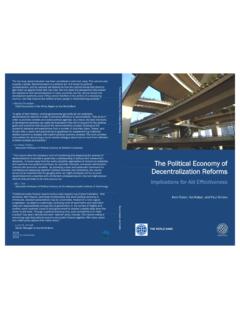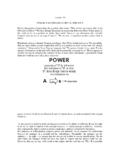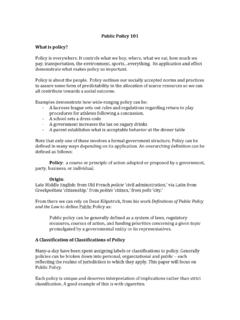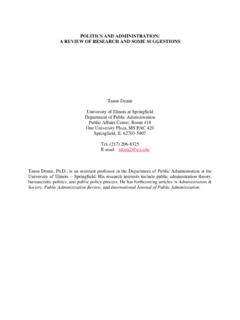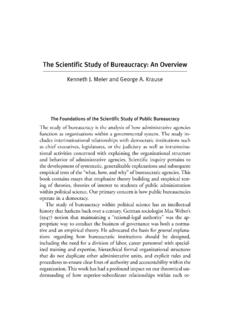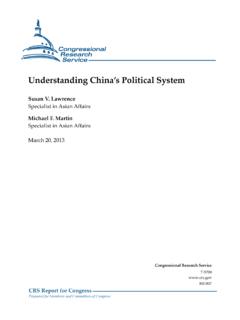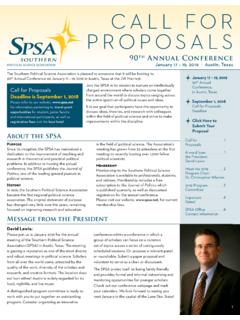Transcription of 2.1 Defining the Concepts - World Bank
1 2. DIMENSIONS OF POLITICAL ECONOMY. Defining the Concepts The term political economy is subject to multiple understandings. Its origin can be found in the work of Adam Smith's Wealth of Nations, of David Ricardo and Karl Marx. In this body of work, the term referred to the conditions of production organization in nation-states or what today is understood as economics'. Today, the term is defined as analysis that studies the linkages between politics and economics, drawing on theo- ries of economics, law as well as political and social sciences. Economic theory traditionally focuses on mar- ket decisions, where voluntary exchange leads to Pareto efficient7 outcomes. The decisions that political economy focuses on are those where the market does not produce these desired outcomes for example, in the case of over-exploitation of land/resources due to unclear tenure as they are influenced by political and not economic considerations.
2 Hence agreements on rules that govern the voluntary exchange are needed, such as property rights or crop rotation regulations. Different disciplines such as psychology, international relations, law or ecology have incorporated the meaning of political economy to study the interactions in their respective disciplines. Ecologists, for instance, think of ways to change market incentives to address environ- mental sustainability concerns. The most common way of approaching political economy in development work tends to be from either an economic perspective using rational choice-based models, or from a political scientific perspective through power-based models. This work is based on the power-based approach. Since the power-based perspec- tive is strongly linked with the economic models and a substantial number of development studies in political economy build on those, we will briefly outline the main analytical arguments to frame our discussion of the political economy of reform.
3 (a) The rational choice perspective on political economy The rational choice approach leads economists to investigate the conditions under which rational individuals are willing to cooperate in collective action problems. This implies the analysis of institutions, defined here as formal and informal rules underlying political powers, bureaucratic agencies or social and private organizations. It also implies giving recommendations to improve institutions to guide individuals' behavior and exchanges so that they can still maximize their own benefit without harming other individuals and the environment8. The most impor- tant relevant streams of work in economics are: the theory of the development of institutions9, the agency theory of bureaucracy10, and rent seeking in public choice theory11. This perspective tends to inform the way that economists tackle political economy challenges such as the im- pacts of decentralization on power relations12, public spending reforms in favor of powerful middle-classes at the expense of less-powerful groups13, institutions and growth14, principal-agent problems ( in voucher 7 Pareto efficiency is achieved when resources are allocated to maximise benefits to all individuals, but without making any individuals worse off in the process.)
4 8 Moe, 2005. 9 North and Weingast, 1989; Buchanan, 1987. 10 Niskanen, 1994. 11 Mueller, 2003. 12 Besley et al, 2005. 13 Keefer and Khemani, 2005; Rudra, forthcoming 14 North, 1990; Rodrik 2004; Keefer and Knack, 1997; Keefer, 2004. 4. systems for education15) and how rent-seeking of vested interests influences public investment, again in favor of some at the expense of others16. (b) A power-based approach Critics of the rational choice perspective on political economy raise the question how and especially by whom institutions are built and can be re-built. They question the capacity of this kind of political economy analysis to engage effectively with political dimensions of policy issues and thus to inform decision-making17. Critics argue that institutions are consistently created by powerful interests that favor the better-off, while losers.
5 Remain in their original state or end up even worse-off, especially in countries with weak governments. Even an alternative approach built on Coase's theorem18, they argue, does not solve the incentive problem. Under this approach inequalities in results of policy interventions are addressed through a bargaining process in which winners of policies have to compensate losers to arrive at a Pareto improving outcome. This as- sumption is questioned by critics such as Moe19, who argue that there remains little incentive for actual com- pensation since winners do not depend on the losers' support to push a reform through. The power-based model emphasizes that cooperation (as is assumed in rational choice models) does not al- ways lead to beneficial outcomes for all. Instead, institutions might be persistently created in favor of power- ful interests.
6 Similarly, North20 argues while the right institutions' may yield economic growth, rulers might often tend not to choose such institutions, but rather those that favor their own interests. Following this power-based view of political economy, some political scientists21 have argued that power is a missing per- spective in the rational choice approach. They emphasize the potentially destructive nature that power can have and therefore suggest integrating power' into the rational choice perspective. Moe22 argues that this might require only a shift in perspectives and analytical adjustment, instead of a new theory of political econ- omy. Approach Taken The power-based model forms the basis of the political economy of reform approach taken here. It draws upon economic, social and political theory in order to understand how political, economic and social actors, institutions and processes influence each other.
7 This model in turn facilitates an analysis of how political economy factors constitute risks or opportunities for country-driven and country owned change through development intervention. The approach will look at how actors use their position to protect or strengthen their political or economic interests. It can reveal the conditions and processes under which political actors or political entrepreneurs maneuver within institutional contexts to build coalitions, negotiate, build consensus, and bargain to generate new policies, new legislation, and new institutions. Political economy analysis has been widely and increasingly applied to policy reform. Grindle and Thomas23. for example, categorize policy reforms and define policies in terms of their costs and benefits. They ask: who wins, and how broadly or narrowly are those benefits distributed?
8 Who loses and where are those losses con- centrated? Secondly, they also stress the context of policy reform, asking: what is the impetus and motivation for reform and how do political interests, that surround reform decisions, play out? In more recent work sup- porting DFID's Drivers of Change' initiative, Grindle24 develops stakeholder and institutional assessment 15 Gauri and Vawda, 2003. 16 Keefer and Knack, 2007. 17 Frey, 1994. 18 see Moe, 2005. 19 Moe, 2005. 20 North, 1990. 21 Bates, 1989; Levi 1988; Moe, 2005; Olson, 1993. 22 Moe, 2005. 23 Grindle and Thomas, 1991. 24 Grindle, 1999. 5. matrices to assess the interests of actors and the institutional context of policy reform. The analysis of stake- holders examines their priorities, motivation, resources, degree of influence, and actual and potential alliances.
9 The analysis of institutions investigates the level of access that different actors have to the policy reform's institutional context, the rules of the game that operate in this context, the distribution of resources of power/influence, and the degree of importance of the institutional context to the outcome of the policy re- form. Levi25 examines the conditions under which citizens have the incentive to comply with, or disobey the demands of democratic governments. One of her main findings is that citizens tend to comply if their per- sonal costs are not higher than the expected benefits and also, if they find the government trustworthy26. Theorists of policy reform are only too aware of the significance of context for determining policy reform progress and outcomes. Pierson and Myles27 highlight the importance of existing policy arrangements as sources of incentives and constraints to change.
10 Grindle and Thomas28 suggest that the length of time needed to implement a reform also has an important influence on the reaction generated to it. Bonoli29 finds that greater concentration of political and institutional power is more likely to incline governments to pursue radical policy reforms, while it also increases possibilities of electoral defeat and popular protest. In contrast, in situations where power is fragmented, governments are compelled to pursue reforms through negotiation and by providing what could be quite substantial quid pro quos'. In this way, reforms are more likely to be accepted, but they are likely to emerge with content that is considerably different to that originally envisaged. In addition to a focus on institutions and actors, political economy analysis can also be applied to the process of policy management.




